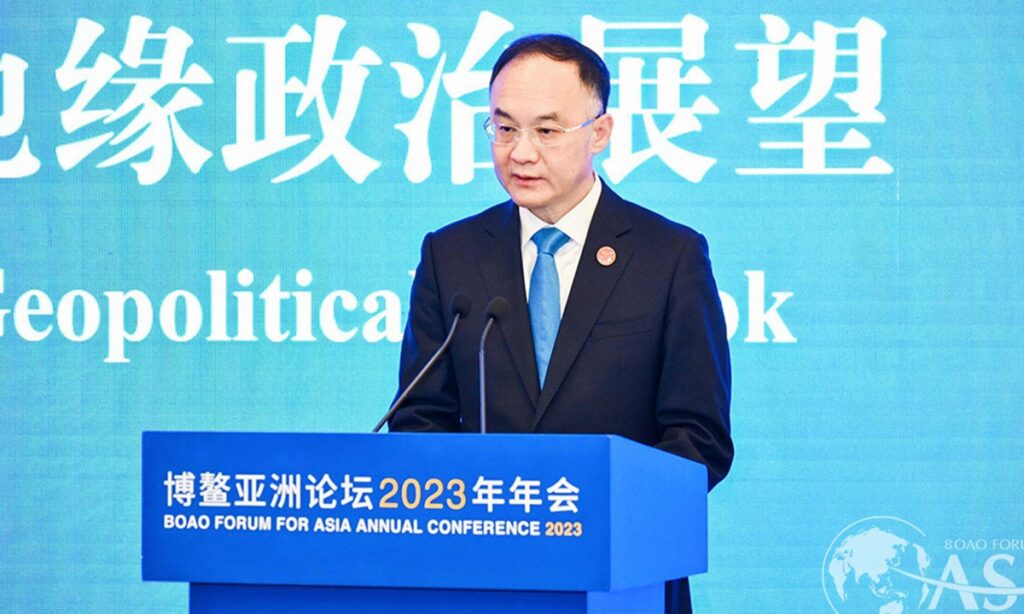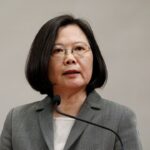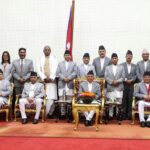Nation’s diplomatic capacity and leadership lead to bigger role in mediation: delegates
The Global Security Initiative (GSI) was revisited at the Boao Forum for Asia (BFA) 2023, one year after it was raised at the forum’s 2022 annual conference by President Xi Jinping, when delegates discussed the ideal approach as well as China’s role in tackling global and regional security challenges.
While addressing the panel themed “Global Geopolitical Outlook,” Assistant Minister of Foreign Affairs Nong Rong called on the international community to “make the right choice between peace and war, unity and division, development and decline” against the backdrop of lingering Ukraine crisis and rising “temperatures” in the Asia-Pacific, namely the intensifying geopolitical competition and military rivalry and the unfolding of an “Asian NATO.”
The recently released Global Security Initiative Concept Paper identified 20 pressing international security concerns, and put forward suggestions on the platforms and mechanisms for GSI-related cooperation, Nong said. More than 80 countries and international organizations have expressed appreciation and support for the GSI.
It aims to provide more systematic thinking and more feasible measures to solve global security challenges, and demonstrates China’s sense of responsibility for maintaining world peace and its firm resolve to safeguard global security, said the senior official.
Danilo Türk, former president of Slovenia and member of the BFA Council of Advisors, said that China’s Concept Paper provided a platform for communication and brought together all the elements that need to be worked out to bring peace, as he commented on the Ukraine crisis which the Wednesday panel was very much focused on.
It is important to engage as many countries as possible to support the Concept Paper, and then form a “core group” for communications that can lead to a serious negotiation, Türk told the Global Times. He stressed China’s rising diplomatic capacity and leadership in mediation, such as bringing together Saudi Arabia and Iran.
Panelist and Pakistan’s former national security adviser Moeed Yusuf told the Global Times that the GSI proposed by President Xi in 2022 is exactly what the world needs. An effort to put forward a vision on how to get to more cooperation and less competition is really welcomed.
Pakistan has special relations with China, as well as close economic and military ties with the West, Yusuf said. The country seeks to lower the rising temperature in the Asia-Pacific to prevent it from becoming a proxy battlefield of major powers. “Therefore the GSI as a conceptual framework is very important for many Asian countries and we need to keep building on it.”
The remarks were seen as pertaining to NATO-like security arrangements in the Asia-Pacific under the prompting of the US, which Liu Zhenmin, former under secretary-general of the UN, firmly opposed at the Wednesday panel.
Liu advocated the ideal of common security of Asia and a security architecture that is built by and serves the interests of Asian countries, which is resilient to external noises and interruptions.
Nong Rong stressed that regional development has a bearing on where security in the Asia-Pacific is headed, the well-being of the people, and the future of the world. The concepts and principles of the GSI point the way for all parties to jointly maintain security and stability and achieve sustained prosperity.
President Xi has participated in the Boao annual conferences and delivered keynote speeches five times since 2013. In his speeches, words like “together” “joint” “shared” and “cooperation” appear frequently, which demonstrate a Chinese approach in front of challenges that requires consultations on an equal footing, solidarity and inclusiveness, and global justice based on mutual respect and mutual learning, analysts said.
At a time when security and development are closely intertwined, China-proposed initiatives like the Global Development Initiative, the Global Security Initiative, and the Global Civilization Initiative show Chinese commitment and provide Chinese wisdom to tackle global challenges faced by all, Boao delegates noted.
Türk said the world would expect China to come with specific ideas of how to move development globally ahead by introducing its own experience, including that in the ongoing projects of the Belt and Road Initiative.
A World Bank report suggests that by 2030, projects under the BRI could help lift 7.6 million people from extreme poverty and 32 million people from moderate poverty worldwide.
(Global Times)




